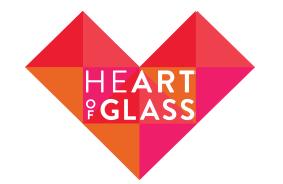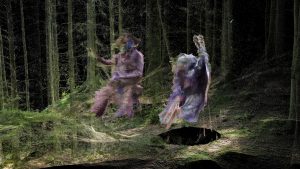A performance-lecture by speculative architect Liam Young.
Date: Wednesday 23rd November 2016
Time: 11.00am-12 noon
Venue: Robert Powell Theatre, University of Salford, Allerton Building, Frederick Road, M6 6PU
Admission: Free
Where the City Can’t See is the first fiction film shot entirely through laser scanning technology. Directed by speculative architect Liam Young and written by author Tim Maughan, the film is set in the Chinese owned and controlled Detroit Economic Zone (DEZ). In a not-too-distant future, Google maps, urban management systems and CCTV surveillance are not only mapping our cities, but ruling them.
Exploring the subcultures that could emerge from these new technologies, the film follows a collection of young factory workers across a single night, as they drift through the smart city in a driverless taxi, searching for a place they know exists, but that the map doesn’t show. They are part of an underground community that work on the production lines by day, by night adorn themselves in machine vision camouflage and the tribal masks of anti-facial recognition, enacting their escapist fantasies in the hidden spaces of the city. They hack the city and journey through a network of stealth buildings, ruinous landscapes, ghost architectures, anomalies, glitches and sprites, searching for the wilds beyond the machines.
Where the City Can’t See is a cross platform production, which has manifested as live performances, installations and now as a short film. The project launched during AND Festival 2015 at Grizedale Forest (Cumbria, UK), as an open film set, where scenes set in the natural environment were recorded. The remainder of the film – including the industrial, urban sequences – was shot in 2016 in Detroit (US). The film brings together composites of these two locations, merging them to create a new, virtual landscape. Young opened this year’s Transmediale festival (Berlin, DE) with a performance-lecture version of the work. The complete film will have its world premiere at The Invisible City: the Cinema of Surveillance, in St. Helens (UK) on 12 November 2016.
The artwork will then be acquired into the University of Salford Art Collection.
Artist Bio
Liam Young is an architect who operates in the spaces between design, fiction and futures. He is founder of the urban futures think tank Tomorrow’s Thoughts Today, a group whose work explores the possibilities of fantastic, perverse and imaginary urbanism’s. Liam also runs the Unknown Fields Division, an award winning nomadic workshop that travels on annual expeditions to the ends of the earth to investigate unreal and forgotten landscapes, alien terrains and industrial ecologies. Liam also coordinates events and exhibitions including the multimedia series ‘Thrilling Wonder Stories: Speculative Futures for an Alternate Present’ and was a curator of the 2013 Lisbon Architecture Triennale. Liam’s projects develop fictional speculations as critical instruments to survey the consequences of emerging environmental and technological futures.
Liam’s inherently collaborative design approach means his work is diverse in its scale and nature. He has been acclaimed in both mainstream and architectural media, including the BBC, NBC, Wired, Time, and Dazed and Confused. Liam was named by Blueprint magazine as one of 25 people who will change architecture and design.
View trailer for Where the City Can’t See.
Credits
Where the City Can’t See is commissioned by Abandon Normal Devices, St Helens Heart of Glass and University of Salford Art Collection. Produced by Liam Young and Abandon Normal Devices, with support from Forestry Commission England’s Forest Art Works and supported using public funding by Arts Council England.
The Invisible City is a programme of film screenings and artist tours presented by AND in partnership with the Heart of Glass. Located at the former Pilkington Glass HQ in St.Helens the programme explores themes of transparency, surveillance and cinematic espionage.
The Invisible City is curated and produced by Heart of Glass and Abandon Normal Devices, in partnership with Alexandra Park (St Helens) Management Limited. This project is supported by Arts Council England and Film Hub North West Central, proud to be a member of the BFI Film Audience Network.
![]()


